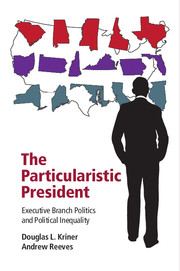Book contents
- Frontmatter
- Contents
- List of Tables
- List of Illustrations
- Acknowledgments
- 1 Introduction
- 2 The Origins of Presidential Particularism
- 3 Base Closings and Trade
- 4 Disaster Declarations and Transportation Grants
- 5 Federal Grants and Presidential Particularism
- 6 The Electoral Rewards of Presidential Particularism
- 7 Conclusion
- Appendix A Technical Appendix to Chapter 3
- Appendix B Technical Appendix to Chapter 4
- Appendix C Technical Appendix to Chapter 5
- Appendix D Technical Appendix to Chapter 6
- References
- Index
1 - Introduction
Published online by Cambridge University Press: 05 June 2015
- Frontmatter
- Contents
- List of Tables
- List of Illustrations
- Acknowledgments
- 1 Introduction
- 2 The Origins of Presidential Particularism
- 3 Base Closings and Trade
- 4 Disaster Declarations and Transportation Grants
- 5 Federal Grants and Presidential Particularism
- 6 The Electoral Rewards of Presidential Particularism
- 7 Conclusion
- Appendix A Technical Appendix to Chapter 3
- Appendix B Technical Appendix to Chapter 4
- Appendix C Technical Appendix to Chapter 5
- Appendix D Technical Appendix to Chapter 6
- References
- Index
Summary
More than a century ago, Woodrow Wilson, the only president of the American Political Science Association to become president of the United States, articulated a vision of the chief executive as the only actor in our system capable of representing and serving the interests of the nation as a whole. Contrasting members of Congress who are “representatives of localities” and “voted for only by sections of voters” with presidents who are elected by the nation, Wilson concluded that the presidency “is the representative of no constituency, but of the whole people.” As a result, Wilson argued, when the president “speaks in his true character, he speaks for no special interest. If he rightly interprets the national thought and boldly insists upon it, he is irresistible.”
Wilson's view continues to hold great currency today as scholars, pundits, and presidents themselves tout the office of the presidency as a universalistic counterbalance to Congress, whose members all too often put the interests of their constituents above those of the nation as a whole. While members of Congress are driven to pursue policies that benefit their narrow geographic constituencies, presidents alone take a broader view and pursue policies that maximize the general welfare. The contrasts are often held to be particularly acute in the realm of divide-the-dollar politics. As law professor and Federalist Society cofounder Steven Calabresi describes, the president is “our only constitutional backstop against the redistributive collective action problem.” Members of Congress seek to “bring home the bacon” to their own constituencies. Presidents take a holistic view and instead seek policies that maximize outcomes for the country at large.
Undoubtedly, presidents do approach policy from a different perspective than do members of Congress, and they are often uniquely positioned to view political challenges through a national lens. But is the presidency really a “constitutional backstop” defending us from parochial policies rife with inefficiencies? We argue no, and throughout the book we show that electoral and partisan incentives combine to encourage presidents to pursue policies across a range of issues that systematically target benefits to politically valuable constituencies.
- Type
- Chapter
- Information
- The Particularistic PresidentExecutive Branch Politics and Political Inequality, pp. 1 - 28Publisher: Cambridge University PressPrint publication year: 2015
- 1
- Cited by

